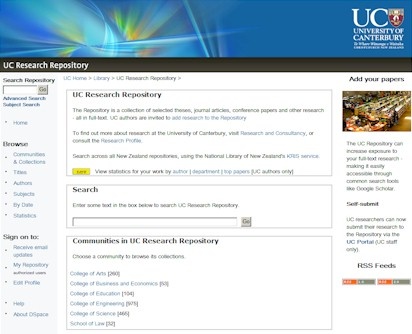Introduction
The UC Research Repository is an open-access database of original research authored by Canterbury academics, researchers and postgraduate students. The Repository exists to expose UC research to as wide an audience as possible, by providing free access to full-text research, through common internet search tools, such as Google Scholar and SCOPUS.
The Repository works as an archive for Canterbury research, and features a well-structured, search engine friendly database format. The Repository is integrated with the UC People & Research Database and the Research Profile. Our Repository is also a member repository of the National Library of New Zealand's Kiwi Research Information Service (KRIS).
|
contents |
|
|
||
|
||
|
||
|
||
|
Getting your research into the Repository
You can add your research in one of three ways:
- Self submission via the UC People & Research Database
- Emailing the full-text research to the Repository, or your Information Librarian
- Using the thesis self-submission guidelines
Formats
While theses, coference papers, posters and working papers are normally accepted in their final format, copyright is often an issue for us when making journal articles open-access. Copyright of articles published in scholarly journals is most often transferred from the author(s) to the publisher. Despite this, most journal publishers do allow authors to make their work open-access, albeit with some restrictions on the format of the paper you use.
Once your research has ben submitted, the Library carefully vets your submission for copyright compliance (checking the publisher's policy on open-access archiving), after which it is categorised using the Marsden Fund's subject classification scheme, after which the item is made live.
What kinds of research do we collect?
The Repository accepts many types of scholarly output, and can handle accommodate written documents, images, video and audio recordings. The bulk of our collection consists of:
- books
- chapters in books
- conference papers (and powerpoint displays)
- journal articles
- reports
- theses (masters and doctoral)
- working papers
Finding out whether it works - statistics
While web statistics are less than 100% reliable, we wdo allow you to monitor the performance of your work in the repository.
You can find statistics for authors by College, School or department, view titles available in the Repository for any given author, or create a list of the 'top' items in the Repository as a whole, or by College, School and departmental units.
Please note that some of the hits on your work may be from search engines, which typically inflate the figures for you work in the first few weeks of its existence in the Repository. In our experience, the 'interference' from search engine hits becomes insignificant over time.
Software
The Repository uses Dspace, an open-source, OAI compliant tool created jointly by MIT and HP Labs. The software is maintained by the University of Canterbury's Library IT department, and by ICTS.
